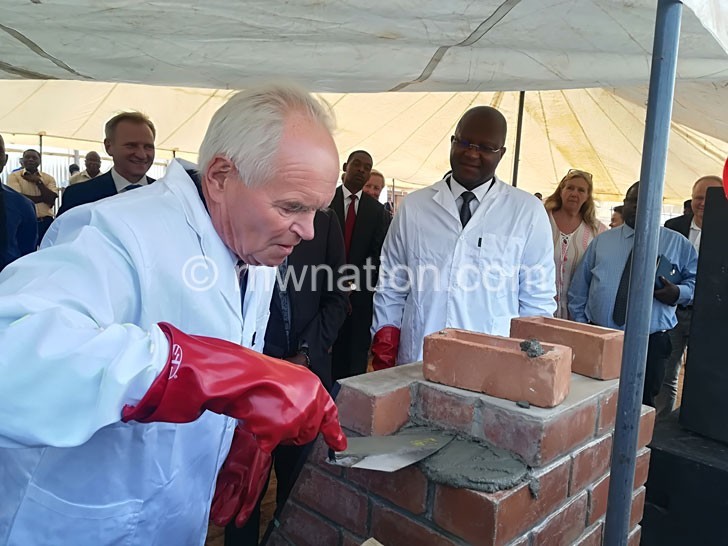K17bn invested in specialised clinic
People who cannot afford expensive specialised bone and nerve surgeries will soon access such services for free courtesy a K17 billion (about $24 million) grant to construct of a modern clinic in Lilongwe.
The Lilongwe Institute of Orthopedics and Neurosurgery (Lions) Clinic will be constructed at Kamuzu Central Hospital (KCH) and is expected to provide free specialised orthopedics–related support that is currently accessed at a fee at the privately-run Beit Cure International Hospital in Blantyre.

A number of partners have funded the project. They include a Norwegian philanthropist Trond Mohn, who contributed over K2.8 billion ($4 million), Alliance Foundation, Auckland University Hospital and the Norwegian Government.
Scheduled to be completed in two years, the clinic will be particularly useful for accident victims, most of whom suffer from various injuries requiring specialised assistance such as hip replacement.
Mohn took part in the laying of the clinic’s foundation stone at a function presided over by Minister of Health and Population Atupele Muluzi at KCH on Wednesday. Norwegian Ambassador Stainer Hagen was among the dignitaries at the function.
Mohn said he was glad to be part of the life-saving project in Malawi.
Hagen, on the other hand, said he was touched to see the many challenges patients face at KCH, stressing this was the more reason his government is determined to help put up the clinic, among other planned projects within the health sector.
Muluzi said the increasing road accidents in the country are overwhelming public health facilities which are attending to a high number of casualties against limited resources.
He said Malawi has the second highest rate of road traffic deaths in the world, after Thailand, with an estimated 6 000 deaths every year and up to 100 000 people needing treatment for road traffic injuries (RTIs) annually.
The minister pointed out that KCH operates under pressure, as it attends to a huge number of road accident casualties.
He added: “Here, at KCH, the team treats about 4 000 victims of road traffic accidents annually. These numbers are projected to double in the next 10 years despite the work that the government is doing to improve our road infrastructure. The Lions Centre will go a long way to better supporting trauma victims across Malawi.
“At the moment, 12 percent of our population is living with musculoskeletal impairment [MSI]/disability cases, of which half are children.”
Records at KCH indicate that the hospital attends to an average of 60 to 80 patients seeking orthopaedic services every day. Most of the cases are due to road accidents.
In an interview, the hospital director Jonathan Ngoma said the establishment of the new clinic will help decongest the main hospital, whose theatres are shared by various patients, including casualties.
According to design details, the Lions Clinic will have an outpatient department, surgical sections, wards and central supply services, which include workshops, kitchen, stores and laundry. The clinic will also have staff houses constructed within the compound for easy doctor–on–call arrangements.
Malawi also faces a high shortage of specialists such as neurosurgeons with Ministry of Health records indicating there are two—one based at KCH and the other at Queen Elizabeth Central Hospital (Qech) in Blantyre.
Through the partnership, according to Ngoma, KCH is currently conducting hip replacement under its orthopaedics section. He says the development has helped to save funds which could have been used to refer patients to Beit Cure in Blantyre.
He said each case of hip replacement costs around K6 million and last year, KCH saved about K100 million after providing hip replacement to 22 patients.





